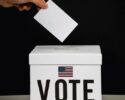Podcasts

Photo: clipart.com, NewsRadio WINA
In this segment, Les Sinclair talks with historian Rick Britton about Today in U.S. History – Today in 1631—that’s 390 years ago—Roger Williams first arrived in the New World from England. Born in 1603, Williams was an author, a theologian, and a Puritan minister. After arriving in Boston in the Massachusetts Bay Colony, Williams worked as a teacher before serving briefly as a colorful pastor at Plymouth and then at Salem. Within a few years, he alarmed the Massachusetts Puritan leadership by speaking out against a number of things (spreading “new and dangerous ideas” as they worded it): for example, he questioned the right of civil authorities to punish religious dissension and the right to confiscate Indian land. In October 1635, he was banished from the Massachusetts Bay Colony by the General Court. After leaving Massachusetts, Williams, with the assistance of the Narragansett tribe, established a settlement at the junction of two rivers near Narragansett Bay in 1636. He declared the settlement open to all those seeking “liberty of conscience” (that was his phrase) and the removal of the church from civil matters. Many dissatisfied Puritans came. Taking the success of the venture as a sign from God, Williams named the community “Providence Plantations.” Among those who found a haven in the religious and political refuge of the Rhode Island Colony were others exiled from Massachusetts, the Quakers, and some of the first Jews to settle in North America. In Providence, Roger Williams also founded the first Baptist church in America (that was in 1638), edited the first dictionary of Native American languages, and organized the first attempt to prohibit slavery in any of England’s North American colonies. Roger Williams died in 1683. Williams’s defense of the Native Americans and his insistence that England pay the Indians for their land put him at the center of many political debates during his life. He was also considered an important historical figure of religious liberty at the time of American independence, and he was a key influence on the thinking of the Founding Fathers.









